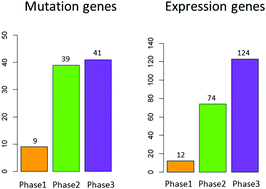当前位置:
X-MOL 学术
›
Mol. Omics
›
论文详情
Our official English website, www.x-mol.net, welcomes your feedback! (Note: you will need to create a separate account there.)
A pan-cancer analysis of progression mechanisms and drug sensitivity in cancer cell lines.
Molecular Omics ( IF 2.9 ) Pub Date : 2019-12-02 , DOI: 10.1039/c9mo00119k Julia L Fleck 1 , Ana B Pavel , Christos G Cassandras
Molecular Omics ( IF 2.9 ) Pub Date : 2019-12-02 , DOI: 10.1039/c9mo00119k Julia L Fleck 1 , Ana B Pavel , Christos G Cassandras
Affiliation

|
Biomarker discovery involves identifying genetic abnormalities within a tumor. However, one of the main challenges in defining such therapeutic targets is accounting for the molecular heterogeneity of cancer. By integrating somatic mutation and gene expression data from hundreds of heterogeneous cell lines from the Cancer Cell Line Encyclopedia (CCLE), we identify sequences of genetic events that may help explain common patterns of oncogenesis across 22 tumor types, and evaluate the general effect of late-stage mutations on drug sensitivity and resistance mechanisms. Through gene enrichment analysis, we find several cancer-specific and immune pathways that are significantly enriched in each of our three proposed phases of cancer progression. By further analyzing the drug activity area associated with compounds that target the BRAF oncogene, a known predictor of drug sensitivity for several compounds used in cancer treatment, we verify that the acquisition of new driver mutations interferes with the targeted drug mechanism, meaning that cells without late-stage mutations generally respond better to drugs.
中文翻译:

对癌细胞系进展机制和药物敏感性的全癌分析。
生物标志物的发现涉及鉴定肿瘤内的遗传异常。然而,定义此类治疗靶标的主要挑战之一是解释癌症的分子异质性。通过整合来自癌细胞系百科全书(CCLE)的数百种异质性细胞系的体细胞突变和基因表达数据,我们确定了可能有助于解释22种肿瘤类型的常见肿瘤发生方式的遗传事件序列,并评估了晚期肿瘤的总体疗效敏感性和耐药机制的早期突变。通过基因富集分析,我们发现在癌症发展的三个拟议阶段中的每个阶段均显着丰富了几种癌症特异性和免疫途径。通过进一步分析与靶向BRAF癌基因的化合物相关的药物活性区域,
更新日期:2019-12-02
中文翻译:

对癌细胞系进展机制和药物敏感性的全癌分析。
生物标志物的发现涉及鉴定肿瘤内的遗传异常。然而,定义此类治疗靶标的主要挑战之一是解释癌症的分子异质性。通过整合来自癌细胞系百科全书(CCLE)的数百种异质性细胞系的体细胞突变和基因表达数据,我们确定了可能有助于解释22种肿瘤类型的常见肿瘤发生方式的遗传事件序列,并评估了晚期肿瘤的总体疗效敏感性和耐药机制的早期突变。通过基因富集分析,我们发现在癌症发展的三个拟议阶段中的每个阶段均显着丰富了几种癌症特异性和免疫途径。通过进一步分析与靶向BRAF癌基因的化合物相关的药物活性区域,


























 京公网安备 11010802027423号
京公网安备 11010802027423号